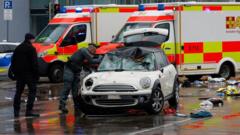In a shocking incident just a week prior to Germany's federal elections, a car rammed into a crowd of people in Munich, leaving at least 30 individuals injured, some critically. The perpetrator, identified as 24-year-old Afghan asylum seeker Farhad N., was taken into custody at the scene. Police have since assigned counter-terrorism units to investigate the attack, which is linked to the suspect’s suspected extremist affiliations.
The incident unfolded amidst heightened tensions surrounding immigration policies and security, particularly in light of previous tragic occurrences involving immigrant perpetrators. Following the attack, Chancellor Olaf Scholz emphasized the need for the individual to face justice and be removed from the country. The incident occurred during a rally organized by the transport workers' union near Munich's main train station.
Eyewitness accounts depicted chaos as people sought shelter, with rescue helicopters responding swiftly to the scene. The presence of children among the injured deepened the shock of the event. This incident is now under scrutiny as officials call for investigations into the suspect’s immigration status; he reportedly entered the country as a minor in 2016, but had his asylum request denied the following year. Authorities confirm that he was scheduled for deportation in 2020 but remained in the country due to ongoing security concerns in Afghanistan.
The Munich attack, reminiscent of earlier tragedies such as the Magdeburg Christmas market assault that claimed six lives, reignited debates over Germany’s immigration and asylum policies. Bavaria’s Premier Markus Söder characterized the event as a potential targeted attack, calling for swift changes in government policies.
As these incidents unfold, the looming federal elections on February 23 become increasingly intertwined with public debates on immigration, particularly with the far-right Alternative for Germany party gaining traction in opinion polls. With promises of increased deportations of serious offenders, Scholz's Social Democrats face pressure to respond effectively to growing security concerns.
Overall, the Munich car ramming has cast a shadow over the upcoming elections, heightening scrutiny of security measures and the integration of immigrant populations in Germany.




















